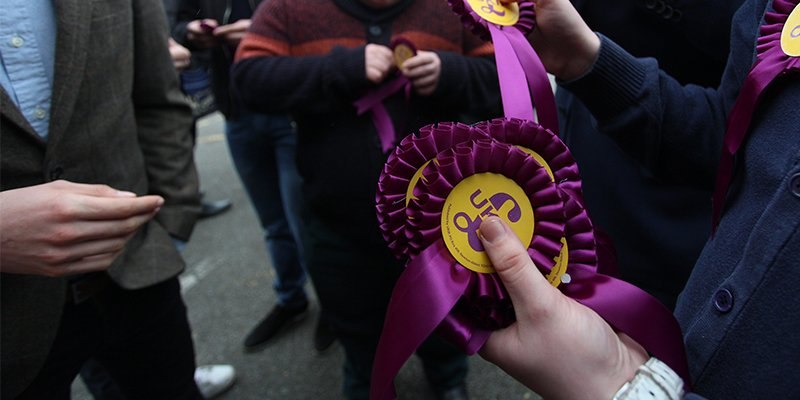In the first survey of its kind in the UK, YouGov provides a detailed insight into the UKIP party membership
This should be a great time to be a member of UKIP. With a strong showing in terms of votes at the 2015 general election and the surprise victory for the Leave campaign at the EU referendum, the party's key aim has been met and UKIP should be well placed to capitalise on its own success. Instead, the party has descended into infighting with members are shortly being balloted on their second leadership contest in as many months.
But who are UKIP's members? Where do they come from, what do they believe in, and where do they think the party should go now? Whilst the party's membership is much smaller than Labour's – which we also surveyed during their recent leadership election – YouGov's panelbase is large enough for us to draw a representative sample. What follows is the first ever survey of UKIP party members by any polling company. The results of the survey are weighted to be representative by age, gender, region, and past leadership vote, using the same methodology as our Labour leadership polling.
The UKIP membership is heavily composed of former Conservative voters
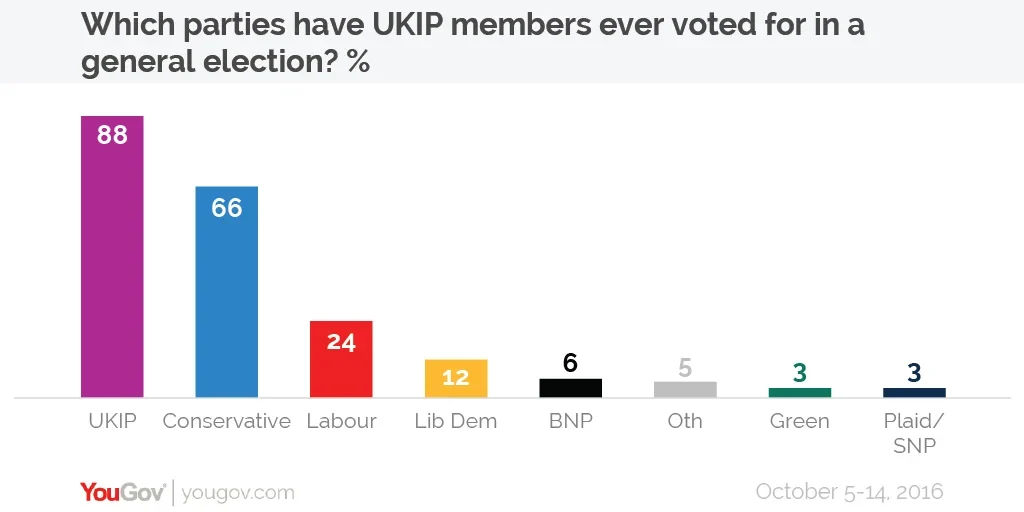
No real surprise here, but worth quantifying nonetheless. Fewer than a quarter of UKIP members (24%) have ever voted for the Labour party, whilst two thirds (66%) have voted for the Conservatives at previous elections. Unsurprisingly, the vast majority (88%) have voted for UKIP previously.
The UKIP membership is overwhelmingly right wing and are happy with the direction the party is going in
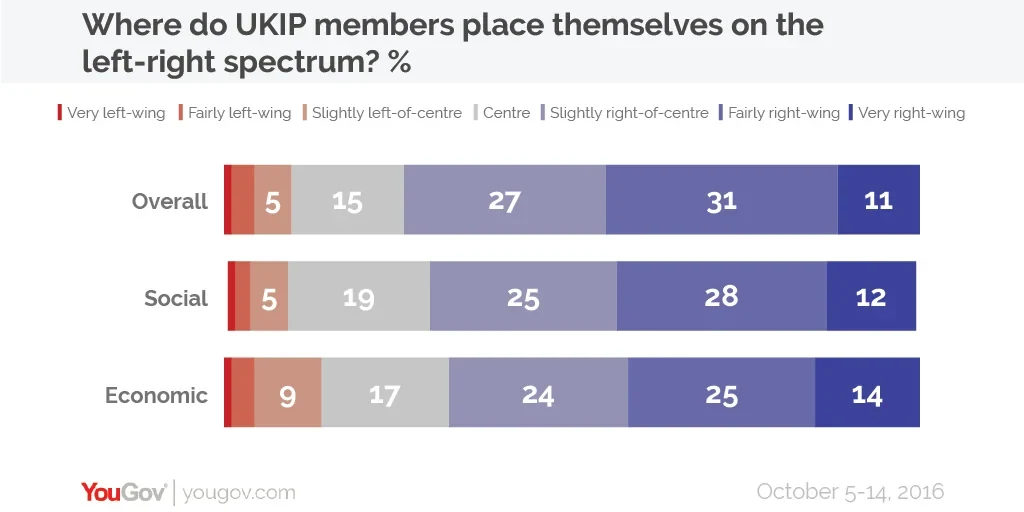
More than two thirds of UKIP members (69%) identify as being right of centre, whilst just 9% consider themselves left of centre. Just over 10% consider themselves to be "very" right wing, whilst about half consider themselves to be either "slightly" or "fairly" right wing.
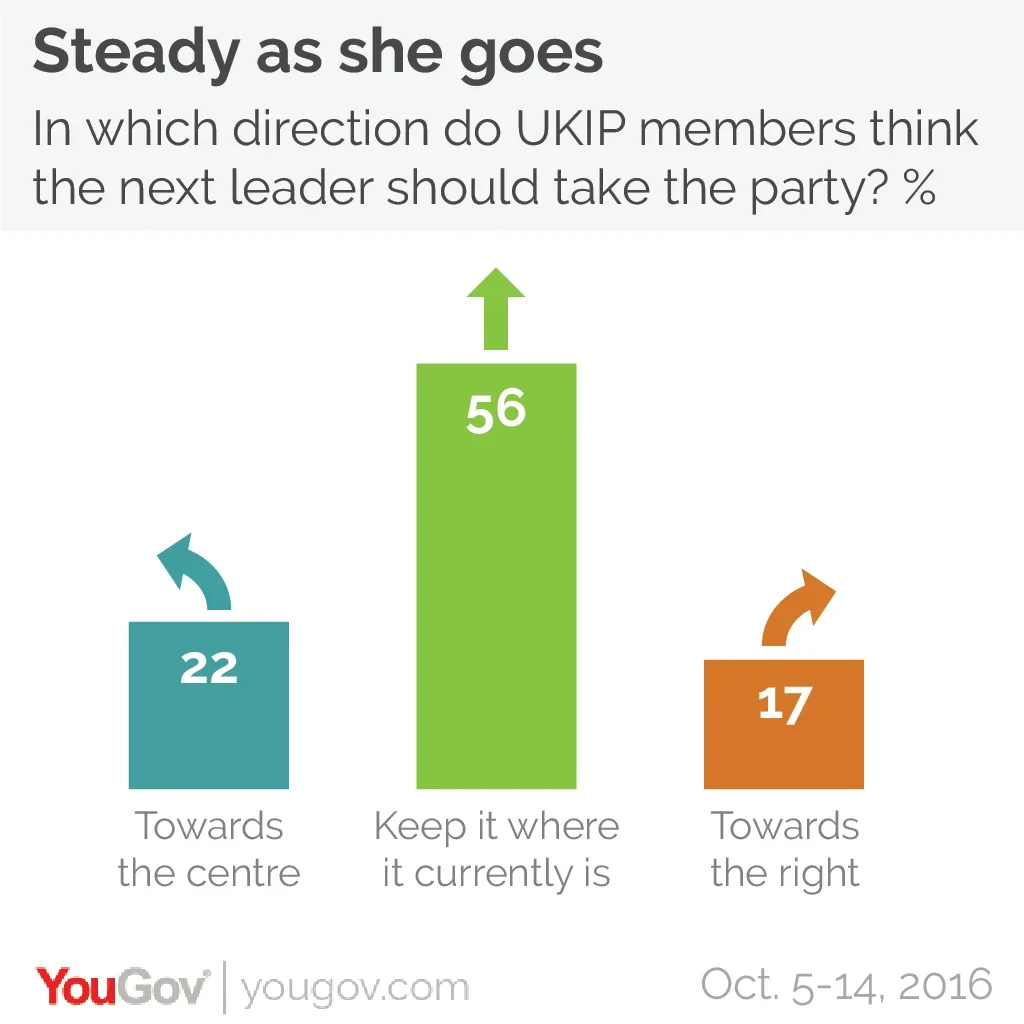
They also consider the party to be in about the right place on the ideological spectrum. Asked which direction they thought the next leader should take the party, more than half (56%) said that it should be kept where it currently is. One in five (22%) think the party should move towards the centre, whilst 17% think it should move further to the right.
UKIP members want the party to target Labour voters, but are not willing to compromise in order to do so
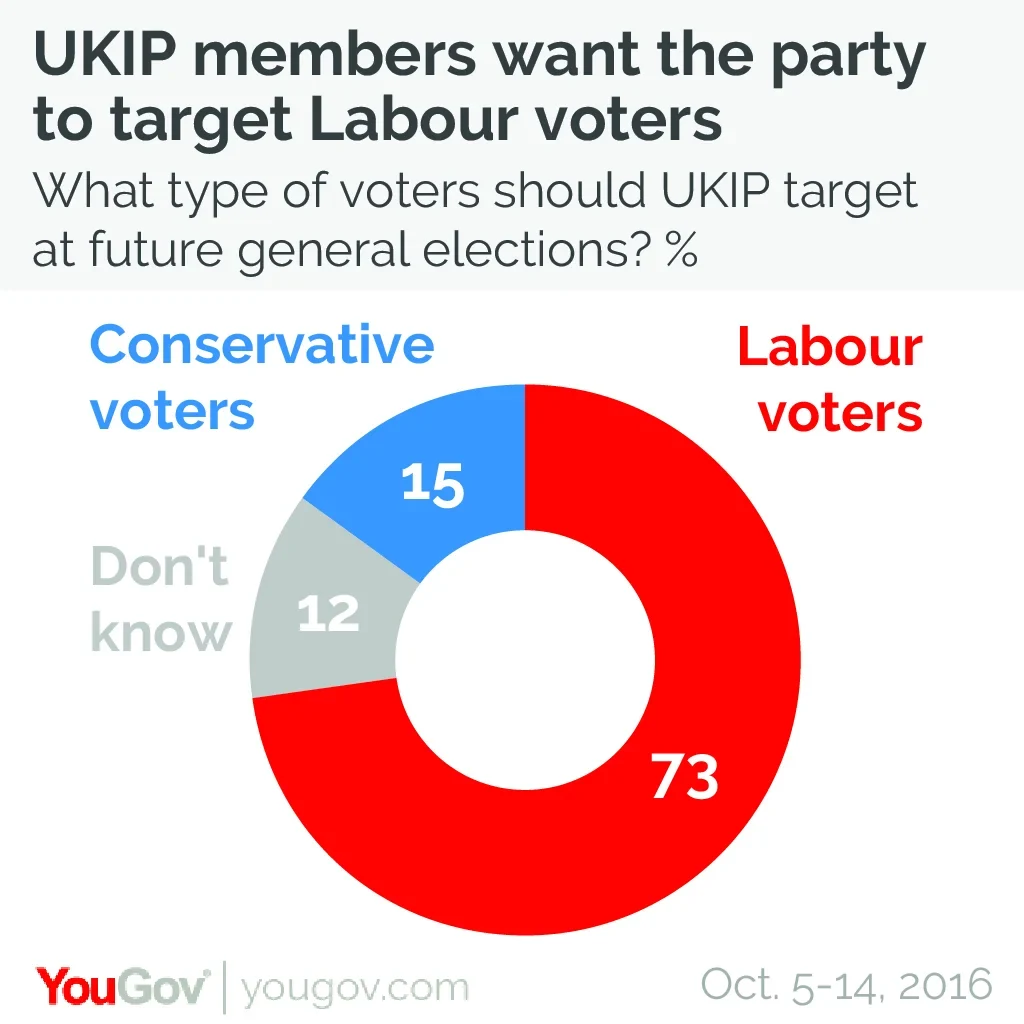
Nearly three quarters of UKIP members think that future general election campaigns should be targeted at Labour voters. The logic behind this is obvious – the party had already come close to saturation point in terms of the numbers of Conservative voters it could feasibly attract. Now with Brexit now a certainty and a new more right wing Prime Minister in post, it is going to be even harder to attract voters from the Conservatives.
Disaffected Labour voters offer far more fertile ground however. UKIP has already been making inroads in traditional Labour heartlands, and anti-immigration Labour voters who are not represented by the party's current leadership will be a particularly attractive target.
That being said, if some sort of strategic compromise is required to attract such voters, the membership does not appear to be flexible enough to countenance it. Six in ten members believe ideological purity is better than compromising in order to maximise the party's electoral chances – nearly three times the 22% who would be willing to jettison unpopular politics in order to attract new voters.
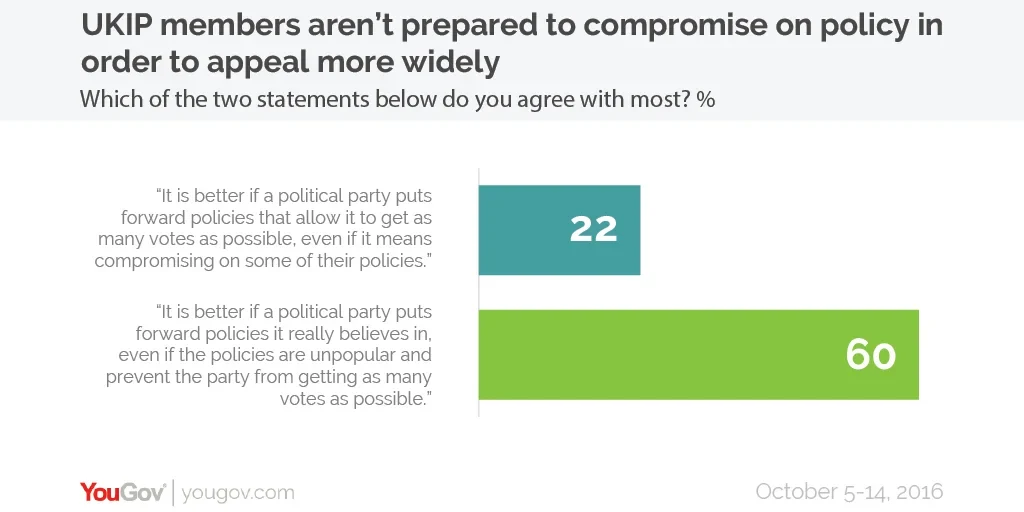
UKIP is here to stay – according to UKIP members
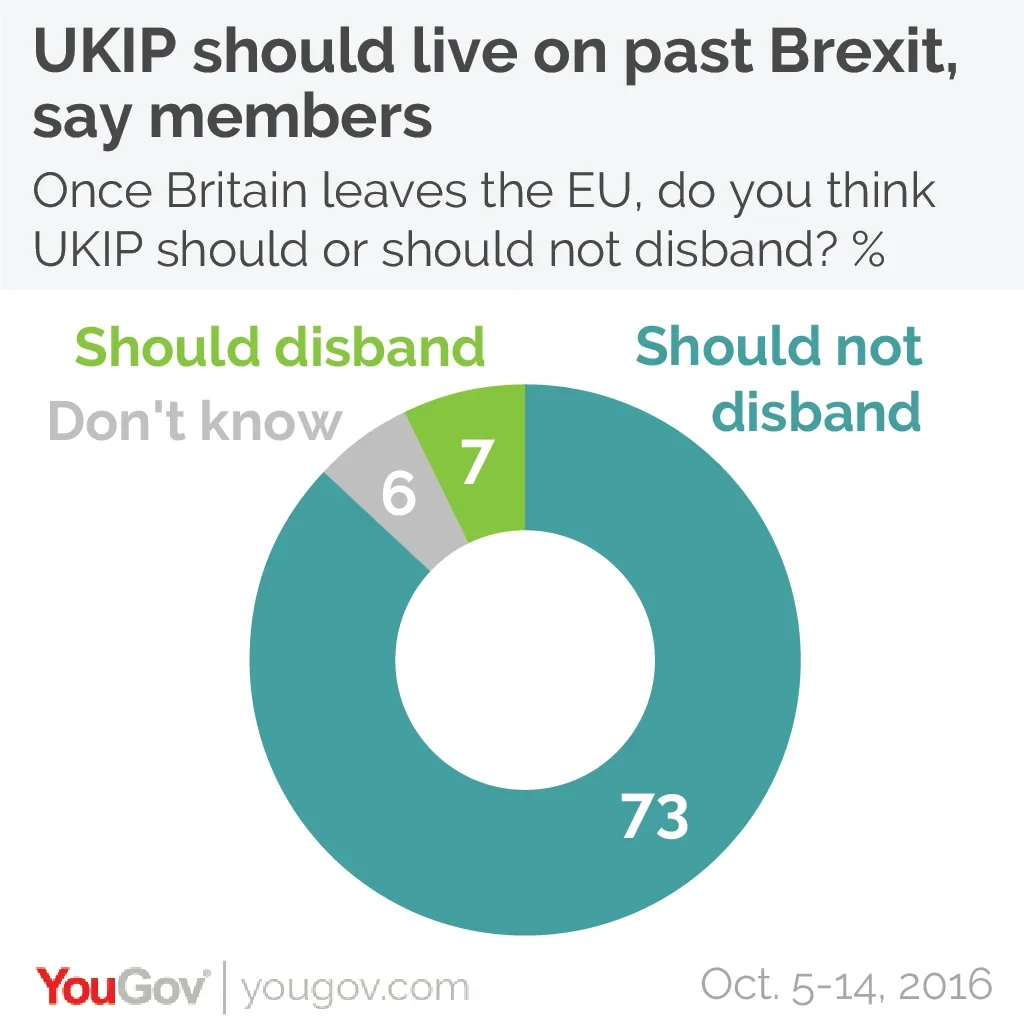
UKIP has clearly progressed beyond a single issue party in the minds of its members. Nearly nine in ten (87%) see no reason for the party to disband upon Britain’s withdrawal from the European Union, compared to just 7% think the party should declare 'mission accomplished' and call it a day.
They are also assured of the party’s continued importance in the British political landscape. Nearly eight in ten (78%) believe that the party will still be an important force in ten years’ time. The only other party for which they can say the same are the Conservatives (87%) – almost half (48%) think the Labour party will be a spent force in ten years’ time, as well as 57% for the Greens and 73% for the Lib Dems.
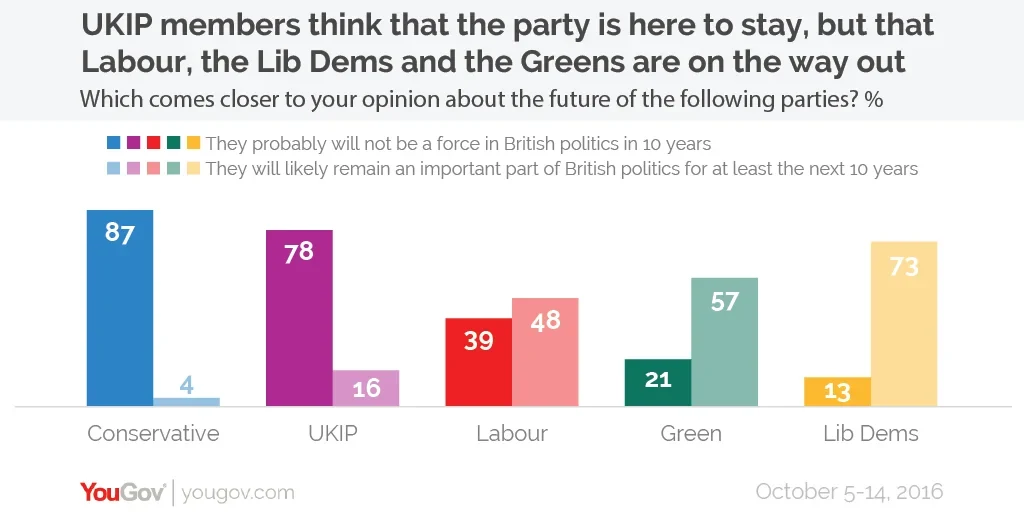
Unlike Steven Woolfe, UKIP members are clear on what the party stands for
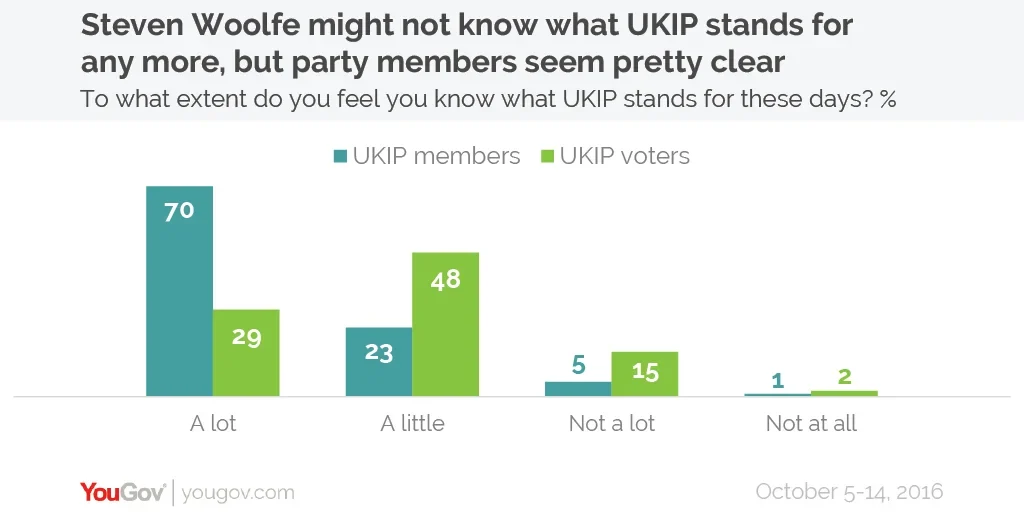
In his resignation article, Steven Wolfe said that he believed the last few months demonstrated that lacks direction and purpose. UKIP members strongly disagree – seven in ten say that they are very clear what the party stands for, whilst just 6% say they are uncertain.
The party also has a relatively decent level of cut-through with the general public – just over half (51%) say that they have at least a broad idea of what the party stands for. This is a very favourable level when compared with the beleaguered Liberal Democrats, for whom 23% of the public gave the same answer when this question was put to them in mid-September.
UKIP members are confident the next election will be much more successful than 2015
Party members believe that they are on course to win a median of 24% of the vote at the next general election – almost double the 12.6% they achieved in 2015. This would be the highest vote share any third force had achieved since the SDP-Liberal alliance in 1983.
Despite this, they expect to receive a median of just 10 seats for their troubles – less than half of what the SDP-Liberal alliance received on a similar vote share. Nonetheless, 42% of members would consider such a seat tally to be a success.
UKIP members are far more animated by immigration and Brexit than the general public
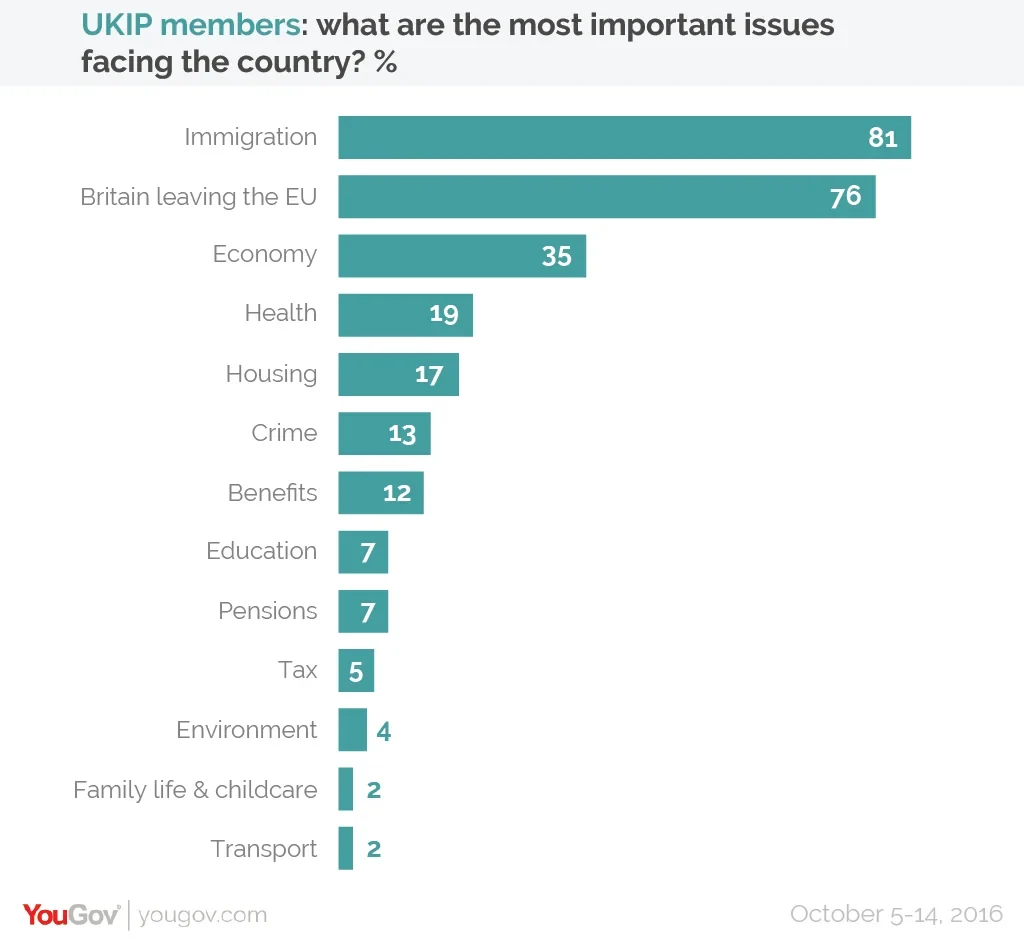
Whilst Brexit and immigration are key issues for the general public, UKIP members are far more likely to say that they are one of the most important issues facing the country. Three quarters (76%) of UKIP members think Brexit is a top issue, compared to 61% of the general public. The difference on immigration is even more pronounced - 81% of UKIP members consider it a top issue, 34 percentage points more than the general public.
Barely a third (35%) think that the economy is one of the most important issues facing the country at the moment. In this, admittedly, they are not so far behind the populace at large among whom 41% think that the economy is one of the most important issues facing the country.
UKIP members think the media is out to get the party, as well as MI5
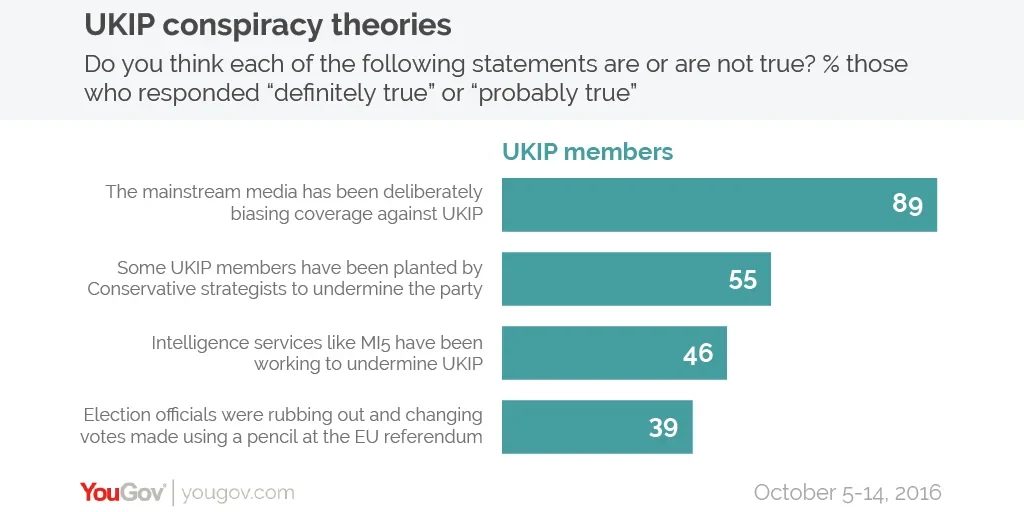
UKIP members clearly believe dark forces are out to disrupt their party, with a high proportion saying they believed in the UKIP conspiracy theories we put to them. Nearly nine in ten (89%) think that the media is deliberately biasing coverage against the party.
They also believe rehashed versions of conspiracy theories specific to the recent Labour leadership election (MI5 working against the party and Tory strategists planting people within the party). Tweaking these questions to apply to UKIP rather than Labour, around half of party members said they believed they were definitely or probably true.
Ironically, the conspiracy theory that UKIP members least accept is the one most associated with their party – the #useapen conspiracy theory from the just prior to the EU referendum vote that election officials would be rubbing out marks on ballots cast in pencil and changing their vote to Remain. Of course, the prevalence of belief in this theory could well have been much higher before the result of the referendum was known. Nonetheless 39% of UKIP members still consider this conspiracy theory to be true (compared to 46% who do not).
Photo: PA
